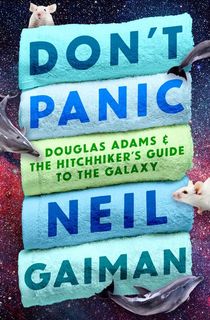March 11th, 2019 would have been the late Douglas Adams' 67th birthday. In his honor, we're sharing stories today that explore Adams' life and legacy.
"Douglas was an incredibly kind man, phenomenally articulate and amazingly helpful.” So says Neil Gaiman, who first met Douglas Adams in 1983, when he was a young journalist assigned to interview the man behind The Hitchhiker’s Guide to the Galaxy. Though Gaiman didn’t know it at the time, this meeting would blossom into a friendship that lasted until Adams’ death in 2001, at just 49 years old. Gaiman considered Adams a rare genius, and someone who profoundly changed his worldview.
He let you look at the world through his eyes. And afterwards you couldn’t see it in the same way ever again.
These words were uttered in a lecture Gaiman delivered in 2015 called “On Immortality and Douglas,” as part of a lecture series hosted by the conservation charity Save the Rhino.
Each year, Save the Rhino honors the late Adams by inviting speakers and guests to commemorate him. A fierce advocate for the protection of wildlife, Adams was a long-time patron of the conservation charity. In addition to supporting Save the Rhinos, Adams published Last Chance to See, a book devoted to raising awareness of the plight of endangered species worldwide. According to Gaiman, Adams put the money and fame that he earned from topping the bestseller list to a noble purpose. Watch Gaiman's tribute in its entirety below.
RELATED: 16 Must-Read Neil Gaiman Books
Though Adams saw great success as a writer, Gaiman says that writing wasn’t a career his late friend passionately pursued, so much as a profession that he had “backed into, or stumbled over, or sat down on very suddenly and broken” (a reference to the late writer’s tall stature and tendency for clumsiness).
Rather, Adams’ true calling was something we don’t have a word for yet–something like a futurologist, or explainer. Regarding Adams’ lasting impression, Gaiman says, “One day maybe we’ll realize that the most important job out there is someone who can explain the world to itself in ways that the world won’t forget, who can dramatize the plight of endangered species as easily as [...] he can explain to an analog race what it means to find yourself going digital. Someone whose dreams and ideas, practical or impractical, are always the size of a planet and who is going to keep going forward and taking the rest of us with him.”
Gaiman also highlights the importance of stories to humankind. By passing on stories, we are able to escape our own reality to access foreign information and memories as if they were our own. Similarly, Douglas Adams’ brilliance lay in his ability to craft stories that allow us to observe from an enlightening new perspective. Gaiman says, “That’s why Douglas was a genius. He let you look at the world through his eyes. And afterwards you couldn’t see it in the same way ever again.”
RELATED: Don't Panic Explores Douglas Adams' 'Lost Year' in LA
Some stories are thousands of years old, meaning they’re the closest thing to immortality that humans can achieve. At nearly a half-century old, The Hitchhiker’s Guide to the Galaxy isn’t exactly ancient, but it has proven tenacious so far. It’s a story that’s valuable enough to have been told over and over again, in different mediums from literature to radio to film. Though he may have died far too soon, Adams lives on through his work, and is well on his way to immortality.
RELATED: What Douglas Adams Learned from Traveling the World
Want more Douglas Adams? Download Neil Gaiman's book Don't Panic: Douglas Adams & The Hitchhiker's Guide to the Galaxy!
This post is sponsored by Open Road Media. Thank you for supporting our partners, who make it possible for The Portalist to continue publishing the sci-fi and fantasy stories you love.

